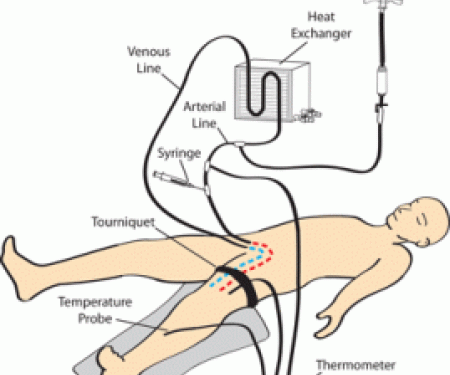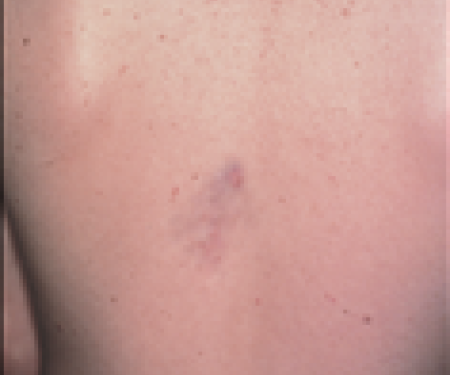Sarcoma is a rare form of cancer that develops in the cells of soft tissue or bones. Soft tissue – including fat, muscles, nerves, tendons, and blood and lymph vessels – connects or supports parts of your body. About 80 percent of sarcomas develop in the cells that make up soft tissue.
Sarcoma can occur anywhere in the body, although it develops most often in the arms or legs. It also commonly begins in the abdominal area – such as in the stomach or intestines, the retroperitoneum (the area in front of the lower spine), the torso, or the head or neck. There are more than 50 types of soft tissue sarcoma with varying appearances and growth rates.
Although sarcomas are very rare, Fox Chase Cancer Center offers a high level of expertise in this type of cancer. Our sarcoma team includes physicians in medical oncology, radiation oncology, orthopedic oncology, and surgical oncology who specialize in the treatment and research of these diseases. Some of the most common sarcomas we treat at Fox Chase include:
- Gastrointestinal stromal tumors (GIST): These tumors develop from specialized cells in the wall of the gastrointestinal tract, most commonly in the stomach or small intestine. As a center that sees a high volume of GIST patients from all over the world, we are able to offer clinical trials and advanced treatment options.
- Retroperitoneal sarcoma: These tumors are found in the inner cavity of the lower trunk or abdomen. Leiomyosarcomas develop from the smooth muscle tissue throughout the body. Liposarcomas are a type of soft tissue sarcoma that begins in the fat cells.
- Undifferentiated pleomorphic sarcoma (UPS): Previously called malignant fibrous histiocytoma (MFH), this aggressive cancer is often found in the extremities or abdomen. Undifferentiated means the cells do not resemble the body tissues in which they develop. Pleomorphic means the cells grow in multiple shapes and sizes.
- Bone sarcoma: These cancers begin in the bones or nearby tissues and include chondrosarcoma, osteogenic sarcoma or Ewing’s sarcoma. The Fox Chase sarcoma team includes specialization in orthopedic oncology surgery to treat these cancers.
- Uterine sarcoma: These cancer cells develop in the muscles of the uterine wall or the connective tissues.
Other common sarcomas include:
- Angiosarcoma: forms in the lining of blood vessels and lymph vessels; can be found on the skin, in the extremities or in organs
- Synovial sarcoma: tends to develop in the extremities or near large joints in the body
- Malignant peripheral nerve sheath tumors: occur in the protective lining surrounding nerve fibers
- Desmoid tumors, also known as aggressive fibromatoses: can grow into nearby tissues but tend not to spread to other sites
Sarcoma Symptoms
Sarcoma might not present any symptoms, or the symptoms could be a result of other problems the tumor is causing in the body (such as blockages or internal bleeding).
Following is a list of possible signs of sarcoma, although they could be an indication of many other medical conditions as well. Consult with your doctor if you have:
- A lump that is new or growing, which may or may not be painful
- Uncomfortable swelling, especially in the arms or legs
- Worsening abdominal pain
- Black or bloody stools
- Unexplained weight loss
Risk Factors: What Causes Sarcoma?
The human body contains trillions of cells, the building blocks of tissue in the body. Normally, cells grow and divide to make new cells as old cells die. When abnormal genetic mutations occur, the cells in our body can become cancer cells. These cells make new ones that are not needed and do not die quickly when old or injured. As this overgrowth of cancer cells continues over time, it forms a mass called a tumor.
Researchers haven’t yet identified the exact reason behind the abnormal cell division process in most cancer cases. However, your chances of developing sarcoma may increase if you have the following risk factors:
- A family history of hereditary cancer syndromes, such as Li-Fraumeni syndrome or familial adenomatous polyposis (FAP)
- Exposure to radiation while treating other cancers, which may develop into sarcoma years later
- Exposure to certain chemicals, such as vinyl chloride, dioxin or phenoxyacetic acid
- Damage to the lymph system
Having any of these risk factors does not mean you will develop sarcoma, and many people with sarcoma have no risk factors.
“When you have such a rare disease, you want a care team that’s very comfortable and has extensive experience with treating your condition. We have the track record and the world-renowned expertise that provides opportunities for our patients that aren’t found at other cancer centers.”
— Krisha Howell, MD, Radiation Oncologist and Sarcoma Specialist



